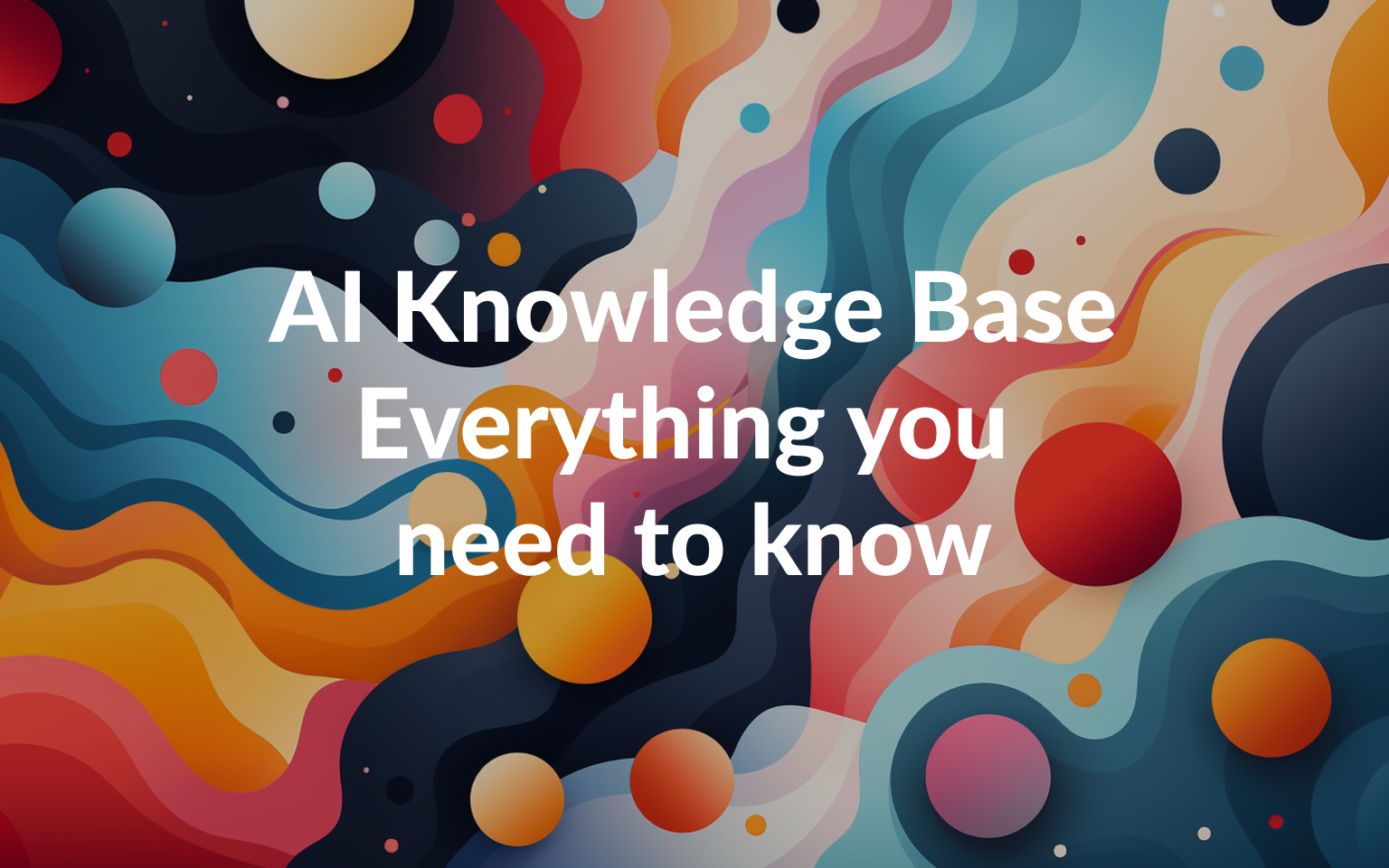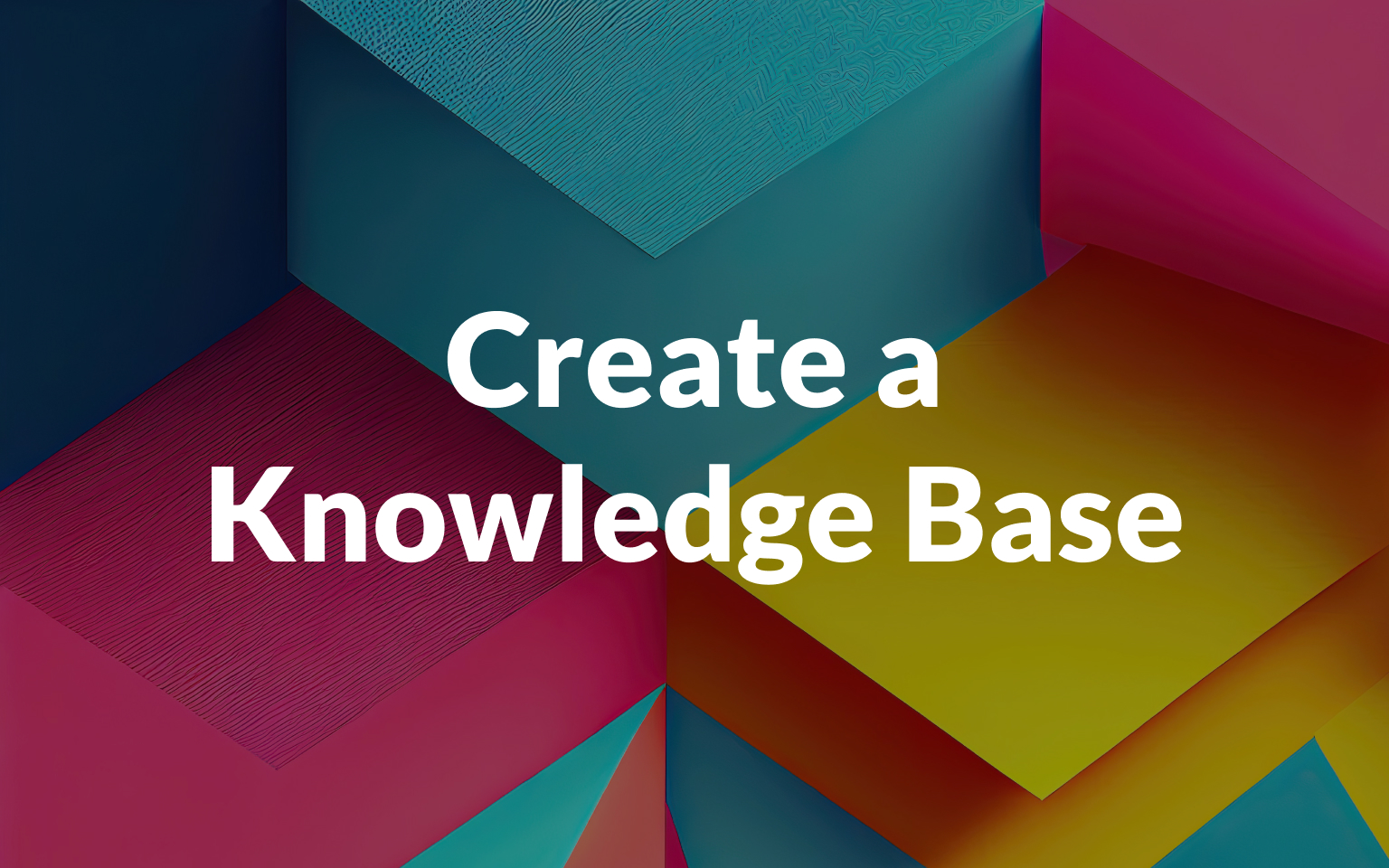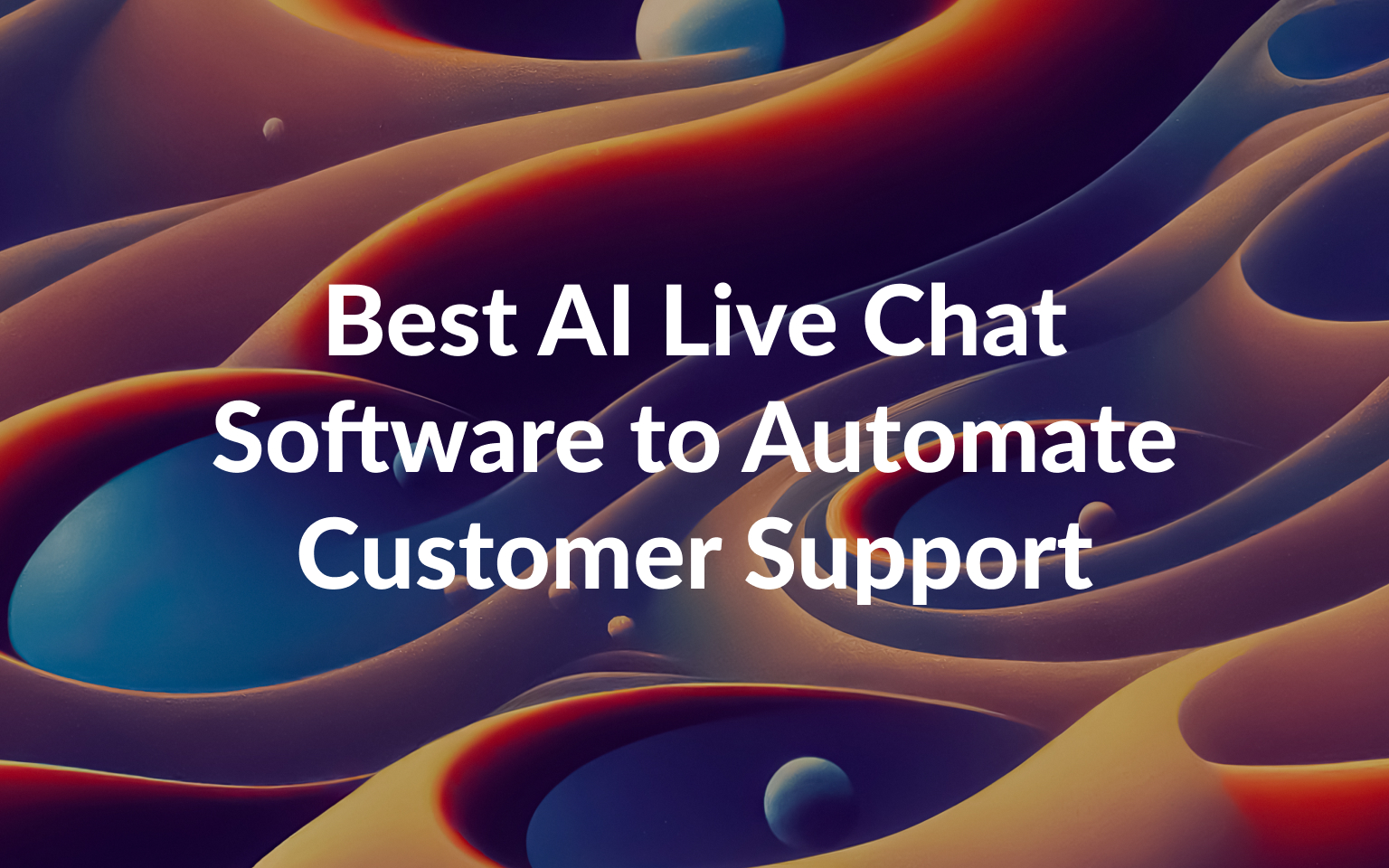

AI Knowledge Base: Everything you Need to Know in 2025

Ever feel overwhelmed with the increasing demands of managing an expanding knowledge base? As a key resource to help reduce ticket load, support your agents, and provide customers with quick solutions, it’s key that your knowledge base stays in tip-top shape. Upgrading your support with an AI knowledge base could be the ideal way to unlock its full potential.
We all know about the advantages of using AI customer service to create more personalized and delightful experiences. Many of these same advantages also translate to augmenting your knowledge base with AI.
Whether you need a full-on introduction to AI knowledge base technologies or some help comparing options, we’ve got you covered. Read on to get one step closer to leveling up one of your most valuable resources.
What is an AI Knowledge Base?
A knowledge base is a centralized, digital repository of, well, knowledge. It serves as both a guide and support tool for your internal support staff as well as a store of self-help resources for your customers or users.
An AI knowledge base uses Artificial Intelligence (AI) to capture, organize, share, manage, and update information more efficiently. These AI-powered knowledge base management systems use technologies like LLMs (large language models) and NLP (natural language processing) to understand and generate human-like content.
This has wholesale benefits for a company’s customer service; from feeding chatbots with more useful information to keeping it updated and relevant for users to find self-help resources to reducing the tedious manual labor needed to maintain a traditional knowledge base.
At the same time, customer service teams can use AI tools to leverage all their customer interactions to continually improve the knowledge base, and vice versa.
Types of AI knowledge base with examples
Depending on the nature of your company, and the support that your customers need, a knowledge base can consist of a huge variety of information.
As the company grows, its associated knowledge grows with it. This can lead to the knowledge base becoming overwhelmingly vast, which can make finding the exact piece of information you need like looking for a needle in a haystack.
This is one issue that AI chatbots are particularly good at solving. Users or support agents can prompt the chatbot with natural language queries like you would when asking a librarian to help you find a book in a library.
The AI chatbot then sifts through the knowledge base at superhuman speeds to find the most relevant information based on keywords, sentiment analysis, the user’s search history, and other factors.
Because this type of AI is so versatile, it can augment any type of knowledge base, regardless of whether the knowledge base itself is also powered by AI.
Below are some examples of the different types of knowledge bases used today:
Structured Knowledge Content
Structured knowledge content is anything that’s easy to catalog according to a predefined schema. This is what we typically think of when it comes to online self-help resources, such as:
- FAQs (Frequently Asked Questions)
- Step-by-step how-to guides
- Troubleshooting guides
- Product documentation and user manuals
- Glossaries or terminologies
- Release notes and developer updates
It consists of information that can be planned ahead of time and organized according to common factors, like publishing date, feature categories, type of resource, etc.
Unstructured Knowledge Content
In contrast, unstructured content is the type of stuff you can’t really plan for and that doesn’t come in a predetermined format. Instead, you typically get it in a “raw” form that needs to be processed to fit in with the rest of your knowledge base.
Most unstructured data comes from user-generated content, such as:
- Emails and messages
- Social media interactions
- History logs and chat transcripts
- Video, audio, or image submissions (as supporting information for tickets, for example)
- Forum discussions
- User reviews
While some may slide neatly into your existing knowledge base content, it still needs to be analyzed and labeled in some way first. In other cases, it may be completely novel information that requires creating new branches of your knowledge base.
This is a great job for AI because it’s so efficient at analyzing unstructured data and turning it into something useful.
Automated Knowledge Content
This is the next evolutionary step of the traditional knowledgebase, using generative AI to automatically create useful, relevant, and up-to-date content.
For example, an AI agent can analyze all your recent chat interactions and identify new issues or trends among your customer inquiries. It can then determine whether this is due to outdated or lacking knowledge base content and generate new articles based on successful support interactions.
With minimal (or no) human intervention, generative AI can be used to:
- Summarize long-form content into direct, bite-sized answers
- Automatically tag and categorize unstructured content
- Identify new FAQs and generate answers
- Suggest related articles or personalized recommendations
- Generate new canned responses or scripts for AI chatbots
- Translate articles into multiple languages
- Generate video scripts or infographics from articles
- Create Articles from an exchange between a customer and a human team
Combining an AI chatbot with an AI knowledge base is like 1+1 = 3. By working together, both bring out the best in each other, improving the experience for both your agents and customers.
For example, an AI chatbot can analyze its recent chat interactions to identify recurring issues and suggest updates to the knowledge base. At the same time, chatbots can help categorize and tag unstructured content for easier assimilation into the knowledge base.
This can feed into the knowledge base’s generative AI capabilities and create a dynamic self-improving with minimal human interaction to maintain.
Turn Conversations into Knowledge Instantly
Customerly’s AI transforms chat insights into actionable articles, FAQs, and multilingual resources—boosting efficiency like never before.What artificial intelligence powers an AI knowledge base?
Don’t worry — you don’t need to be a computer science buff to understand the underlying mechanisms and technology. However, it will give you a better understanding of how AI does what it does and how you can leverage its impressive capabilities.
Firstly, we have machine learning. This technique allows AI algorithms to train on existing or new data to improve their performance over time. It does this by identifying patterns in the data in order to make new predictions, even when confronted with data it has never seen before.
Next up, natural language processing (NLP) is what enables AI to interpret human language to be able to understand and generate it. It’s what tools like ChatGPT use to interact with humans in a way that feels natural and conversational.
While simple NLP allows AI to identify keywords and analyze context, more advanced systems are capable of more nuanced understanding, such as sentiment analysis.
Combining these two technologies is what really unlocks the full potential of AI to transform a static knowledge base into one that’s dynamic, intelligent, and automated.
Benefits of an AI-powered knowledge base
An AI knowledge base isn’t just a flashy buzzword with isolated, short-term benefits. It has the potential to completely revolutionize your entire approach to customer service.
Just so that you’re clear on what’s up for grabs, here are the main benefits of an AI knowledge base:
- Improve customer self-service and lower ticket volume
- Streamline knowledge discovery for customers and agents
- Speeds up publishing and content updates
- Boosts agent response times and performance
- Enhances AI chatbot expertise and accuracy
The bottom line of these benefits is freeing up your agents to focus on delivering excellent customer service and reduce the need for large content teams. This will lower your customer service’s operational costs while boosting your overall productivity and customer experience!
How to choose the right AI Knowledge Bases for your business
We’ll explore some individual AI knowledge base offerings below. But, before we do that, it’s important that you understand how we curated them to specifically serve the needs of SaaS businesses.
Having AI-powered capabilities is far from the only thing you should look for. To save you time, we’ll cover the most important factors.
If you’re looking for a game-changing AI knowledge base solution for your SaaS, these considerations will help guide your way:
Features and AI capabilities
Many vendors use intentionally vague language about their AI capabilities. To make sure you’re dealing with true AI, look for technologies like NLP or ML or leverage established AI platforms like ChatGPT.
For SaaS companies, it’s extra important that you prioritize AI-based features like onboarding automation, in-app help capabilities, and real-time agent assistance.
Integrations
For a seamless experience, you want an AI customer service solution that’s compatible with your current business apps. Look for official integrations with CRMs, help desk software, AI live chat software, etc.
As many SaaS businesses rely on subscription-based offerings for the majority of their revenue, look for AI knowledge base tools that can effectively integrate with and support this.
Ease of use
Your knowledge base should offer an intuitive and user-friendly design that’s easy for your support staff to learn. This minimizes the need for special training and encourages productivity.
For larger and more complex SaaS platforms, in-app guidance or product tours can be super helpful.
Customization and brand-ability
You want to create a consistent experience across all your support resources and make everyone feel at home. Plus, look for the ability to create custom workflows that match your internal processes.
Having consistent and on-brand software is vital for the user experience of something like a SaaS. So, look for knowledge-based software that allows you to build a knowledge base with customizable and white-label interface options.
Compliance and data security
Your customer service AI tools will need to collect and use some customer data to function. So, your software also needs to comply with regulations like GDPR, HIPAA, and CCPA. Another common requirement among SaaS’ is supporting SOC 2 and multi-tenant architectures.
Analytics and Reporting
As part of your process of continual improvement, you need to be able to analyze user behavior, customer satisfaction across various metrics, and trends regarding your knowledge base resources. Look for a solution with AI-powered visualizations and insights.
On top of these, don’t forget about the knowledge base essentials, like multi-lingual support, feedback mechanisms, publishing tools, and collaboration tools.
As a SaaS, focus on tools that offer insights into user engagement, feature adoption, and churn prediction to analyze your product performance.
The 7 Best AI-Powered Knowledge Base Software in 2025
AI knowledge bases have gained popularity, leading to the development of many different platforms. While they may seem similar on the surface, there is no such thing as one-size-fits-all software for all businesses.
Part of the appeal of an AI knowledge base is transitioning to an integrated customer service experience across all support channels. For that reason, many of these tools are not only some of the best knowledge base software but also some of the best AI customer service solutions out there.
Customerly
Customerly is dedicated to delivering the best all-in-one customer service solution for businesses of all sizes, fueled by AI-powered technologies. Our AI-driven multilingual help center is here to help organizations cut costs, delight customers, and boost agent productivity.
Using generative AI to quickly create helpful FAQs, articles, and even entire collections is just the start. Intelligent analytics help pinpoint underserviced keywords to make sure that your knowledge base addresses all your customers’ concerns.
Combined with our powerful AI chatbots and advanced search functionality, you can empower your customers to find solutions, reducing your support burden in the process.
Let our AI-powered content editor take care of the first draft, error checking, and finding opportunities for improvement. All you need to do is perform final checks and minor touchups. It also flawlessly handles multimedia, so you can create rich experiences without any extra hassle.
Ready to turn your boring old knowledge base into a dynamic resource that empowers your agents and customers? Start a 14-day free trial or book a demo to see how we can transform your knowledge base into a catalyst for exceptional customer experiences.
Pricing: 14-day free trial with plans starting at just $9/month, and AI available from the Startup plan at $49/month.
Say Goodbye to Support Bottlenecks
Customerly’s AI chatbots and intelligent knowledge base work hand-in-hand to automate responses, reduce tickets, and boost agent productivity.Help Scout
Help Scout is a communication-first customer service platform, with a focus on streamlining multi-channel communications. Its feature set has also expanded to include a strong knowledge base platform, called Docs, now powered by AI capabilities.
Businesses can use Help Scout to set up both internal or external help centers in minutes. It is highly customizable, featuring a WYSIWYG editor and handy shortcuts to implement media, like visuals, callouts, tables, and block quotes.
Furthermore, its AI Assist can refine texts, correct grammar & spelling, adjust tone, and translate articles into multiple languages.
Another one of its standout features is the Beacon widget, which proactively suggests recommended articles before you even ask the next question.
Pricing: 15 or 30-day free trial with plans starting at $22/month/user
Korra
Korra’s aim is to help organizations get the full potential out of their existing knowledge base content through a private, ChatGPT-like interface.
Dubbed “Knowledge Fusion,” the platform consolidates information from multiple sources, such as PDFs, web pages, videos, and articles into a unified and accessible format. Users can easily and quickly find answers through an intelligent search engine that uses NLP and ML.
These same capabilities are used to analyze content and identify topic gaps as well as provide new content recommendations through its Advanced Insights Engine.
The platform has 3 primary components — a widget providing AI chat support, a conventional knowledge base portal, and an SDK for third-party integrations.
Pricing: Free plan limits you to 100MB usage and 25 queries/month with pricing starting at $199/month + $39/month/agent
Guru
As a dedicated knowledge management platform, Guru’s entire offering is geared towards boosting your organization’s collective knowledge through company wikis, employee intranets, and enterprise AI searches.
Advanced, AI-powered search that delivers instant answers is one of its main USPs, with capabilities like semantic search and optimizable settings. You can even set up Guru AI to listen in on your internal Slack communications and provide answers from the knowledge base when it detects a question.
To simplify knowledge base management, it brings topic identification, tone shift, translation (into hundreds of languages), automated scheduled cleanups, and more to the table.
Pricing: 30-day free trial with plans starting at $15/month/user
Zendesk
It should come as no surprise that Zendesk offers powerful smart knowledge base tools as part of its comprehensive customer service suite.
One of Zendesk’s key characteristics is the ease of deployment and wide-ranging integrations, so businesses can expect a quick ROI turnaround. Plus, it has invested heavily recently in improving its generative AI capabilities, especially to enhance its self-service options.
For example, Content Cues leverages AI and ML to assess the applicability of your knowledge base according to incoming support tickets and suggest new content topics. It also supports keeping your knowledge base in good shape by identifying top and underperforming topics.
To top it off, Zendesk offers a robust AI chatbot with dynamic, real-time content suggestions for agents.
Pricing: 14-day free trial with pricing starting at $19/month/agent
Slite
Slite is a document management platform that prioritizes “utility over excess.” With a minimalist, clutter-free interface, it certainly sticks to this ethos.
Slite also feels specially tailored to the needs of modern businesses that follow agile practices. It has built-in tools to create and manage company wikis, meeting notes, and onboarding guides, as well as track OKRs (objectives and key results).
Its simple but effective AI writing tool can summarize, translate, spellcheck, and even change the tone of knowledge-base texts.
Unfortunately, you’ll need to integrate it with your own chatbots and help desk solutions, as Slite isn’t an all-in-one customer service suite. Also, while it’s a great tool for creating an internal source of truth for employees, it’s not geared toward creating a customer-facing knowledge base.
Pricing: 14-day free trial with prices starting at $8/month/member
Knowmax
Knowmax calls itself an “AI Guided Knowledge Management Platform,” that focuses on improving the customer experience (CX) with AI-powered tools.
Like others on this list, it uses generative AI to provide instant answers and accelerate content creation. Its “Ask AI” tool allows agents to query the knowledge base to quickly find answers to assist customers.
Plus, it’s easy to automate the knowledge management process with its intuitive workflow and decision tree designers.
Among its other useful features is a convenient Chrome extension and multilingual support for over 15 languages.
However, like Slite, it specializes in knowledge management, without offering much else in terms of customer service.
Pricing: No free trial and custom pricing
What’s the future of AI-powered customer service?
The key feature of AI systems is that they improve with time as they’re trained on more data and real-life situations. This process will only accelerate as its learning experiences compound over time.
While even today’s generative AI has come a long way, future systems will be able to create all types of knowledge base content that are indistinguishable from human-made ones.
As its value becomes more apparent, leaders will invest more in AI to stay ahead of the curve, while laggards will scramble to catch up. At the same time, AI will become an essential tool to help businesses cope with the boom in big data and growing customer bases with personalized needs.
According to current trends, the knowledge base market itself is expected to grow steadily from a current valuation of $21 billion to over $49.51 billion by 2032 (at a CAGR of 12.3%). Precedence research forecasts that AI customer service will significantly outpace it at a CAGR of 25.1%, going from $308.4 million in 2022 to nearly $3 billion by 2032.
At the center of these two movements, AI knowledge base systems will go from being a nice-to-have to a competitive advantage when it comes to customer service and experience.
Take Your Knowledge Base to the Next Level
Join the AI revolution with Customerly. Empower agents, delight customers, and scale effortlessly. Start your free trial nowWhat is the difference between a Knowledge Base and an AI Knowledge Base?
The distinguishing factor is the use of AI, NLP, and ML to automate and streamline knowledge management.
For example, AI can automatically identify new support topics based on customer interactions or if it fails to find an answer to incoming queries. It also supports agents and customers by providing advanced search and discovery tools to find relevant resources faster and with less fuss.
Finally, it supports content teams to improve the quality of and maintain the knowledge base by analyzing topic performance, generating content, or suggesting improvements.
Using conventional knowledge base software, all of this would need to be done manually, which is extremely time-consuming and labor-intensive.
How to build an AI knowledge base?
One of the advantages of leveraging AI is that you only have to set it up once, and it will take care of the rest (with some ongoing supervision, of course). However, you need to carefully plan the initial steps to make the process go smoothly:
1. Identify the key information and types of content (FAQs, articles, guides) your users need most.
2. Explore the market and assess your options to choose an AI-powered knowledge base platform that fits your business requirements.
3. Ensure that your existing content is structured logically and upload it to the platform.
4. Use the built-in training tools and machine learning to improve content suggestions and search accuracy.
5. Monitor and update the AI to Continuously refine content and AI performance based on user feedback and analytics.
What is a knowledge-based chatbot?
A knowledge-based chatbot is a chatbot designed specifically to assist both support agents and customers in finding relevant and useful information from the knowledge base.
AI-powered chatbots can provide automated answers to queries in a conversational manner or direct users to relevant topics based on keywords and sentiment analysis. These tools use NLP and AI to understand complex queries and provide accurate, context-specific answers.





